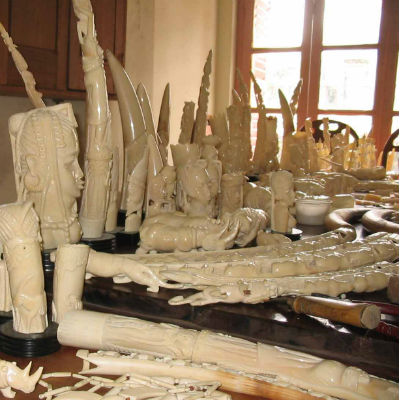The uk ivory bill: will it be enough to save elephants?
THE UK IVORY BILL: WILL IT BE ENOUGH TO SAVE ELEPHANTS?
THE UK GOVERNMENT INTRODUCED ITS IVORY BILL TO PARLIAMENT ON 23RD MAY, BUT WILL IT BE ENOUGH TO SAVE ELEPHANTS, ASKS BORN FREE’S ASSOCIATE DIRECTOR DR MARK JONES?
On 23rd May 2018, the UK Government introduced its Ivory Bill to Parliament.
The Bill is the culmination of years of lobbying by Born Free, other wildlife protection organisations and members of the public, concerned that without concerted action to close down ivory markets, elephants could completely disappear from huge swathes of the African continent in the coming years.
Upwards of 20,000 African elephants are killed each year to supply illicit ivory markets, and elephant numbers across the continent have plummeted to less than 450,000, from perhaps five million a century ago, in large part due to poaching. On average, at least 55 elephants are killed a day by poachers, solely for their tusks. That is about one every 25 minutes.
In recent years, the international community has finally begun to recognise that the existence of legal domestic ivory markets stimulates demand, confounds enforcement efforts and facilitates laundering, thereby incentivising the illegal killing of elephants and undermining field conservation efforts. Ivory poaching and trafficking is largely coordinated by sophisticated criminal networks, whose activities undermine the rule of law and play a role in destabilising societies and economies, as well as devastating elephants and their populations.

The USA and China, two of the world’s largest markets for ivory, have already taken decisive action and banned imports, exports and domestic trade in most ivory products. This left the UK as the world’s largest exporter of legal ivory. Between 2006 and 2015, 50 tusks and more than 25,000 ivory items were declared to have been exported from the UK, many destined for lucrative markets in the Far East. While most of these items were carved from tusks obtained from elephants that died decades ago, the very existence of such an extensive legal trade legitimises ivory in the eyes of consumers, stimulates demand, and provides opportunities for poachers and traffickers to lander their blood-stained products.
The UK’s Ivory Bill has not come a moment too soon. A ban was promised in both the 2010 and 2015 Conservative manifestos, but never delivered by those Governments. It disappeared from the 2017 manifesto, sparking concerns that the current Government would once again fail to act on this vital issue. Fortunately, public pressure has prevailed. Protests and lobbying by NGOs including Born Free let the Government know this was an issue it couldn’t shy away from, and the overwhelming calls for a ban among the tens of thousands of responses to the public consultation held during the last quarter of 2017 clearly articulated the national mood.
Protecting live elephants is far more important than protecting a trade whose colonial legacy is steeped in their blood.
The Ivory Bill doesn’t ban all trade in ivory. Trade in certain older items, such as musical instruments that contain a small proportion of ivory, portrait miniatures, and items considered to be of outstanding cultural or artistic value, will still be permitted under certain conditions. Museums will still be allowed to buy important historical ivory artefacts, and trade them between themselves. These exemptions will need to be carefully scrutinised and monitored to make sure no-one can break the rules, and that they can never be exploited by the traffickers. Trade in ivory products derived from other species, such as hippos, narwhals and walruses, will not be subject to the Bill when it is introduced, but the Government has promised to consult soon on whether these should also be restricted, which is good news given the concerns about the ongoing exploitation of these species.
Nevertheless, the Bill represents a big step forward by the UK Government, and sets a standard for the rest of the European Union, which to date has doggedly resisted calls for the introduction of further restrictions across all its Member States.
The Government’s aim is to have the Ivory Bill on the statute book by the time it hosts the Illegal Wildlife Trade conference in London in October (albeit there will probably be a lead-in period before it is enforced). When the Bill was first introduced this looked like a tall order, but so far the Bill has had an amazingly quick passage through its readings and Committee stages in the Commons. It is now beginning its passage through the House of Lords. With cross-bench support, and a bit of luck, that ambition might just be achievable.
With Hong Kong and Taiwan following the example set by the USA and China, and Australia currently considering the UK’s Bill as an example, perhaps the future is finally beginning to look a little brighter for elephants. However, there is no room for complacency. Only by taking ivory completely out of commercial trade can we hope to secure the future of these magnificent and vitally important animals.
